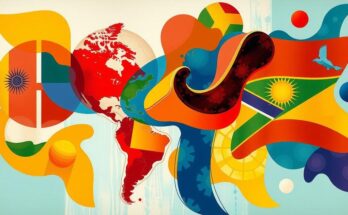Ecuadorians voted in a tense presidential election marked by violence and economic strife. Sixteen candidates are vying for the presidency, with incumbent Daniel Noboa facing off against Luisa Gonzalez. Heavy security was implemented amid threats to the electoral process, as the nation struggles with rising crime and economic challenges.
On a tense Sunday, approximately 14 million Ecuadorians participated in the presidential election aimed at addressing the profound crisis gripping the nation. Sixteen candidates, including the incumbent Daniel Noboa and his leftist opponent Luisa Gonzalez, competed for leadership amid escalating violence and economic strife. Citizens expressed frustration over the current situation, highlighting the urgent need for effective governance to remedy the turmoil.
Heavy security measures were implemented, with armed military personnel deployed at polling stations due to threats of violence targeting the democratic process. Despite some minor infringements on election regulations, such as violations of a three-day alcohol ban, the environment remained fraught with tension. Candidates campaigned under the shadow of recent violent incidents, including the assassination of a competitor earlier this year.
Gonzalez acknowledged the fear that permeated the election, citing intelligence reports indicating threats against her life but emphasizing the necessity for transformative change in the country. Meanwhile, Noboa, the youthful incumbent, strived to leverage his popularity and assertive crime policies to secure a straightforward victory without a run-off round. Opinion polls suggested he held a commanding lead, potentially allowing him to win outright.
The ongoing drug trade, particularly related to Ecuador’s ports, has led to drastic increases in violence, complicating the economic landscape further fragmented by an impending recession. Noboa’s administration is attempting to curb this surge in crime by utilizing military forces while also mitigating severe economic issues exacerbated by a lack of foreign investment and tourism.
As the election proceedings unfolded, both candidates confronted significant challenges, including sustained pressures from international financial organizations such as the IMF. Gonzalez attempted to quell investor fears regarding her economic policies, reinforcing her commitment to working with financial entities while avoiding detrimental cuts to vulnerable populations. The fate of the economy, precariously hanging, intertwined with the political future shaped by this election.
The current situation in Ecuador is dire, with expectations of increased unemployment and social unrest looming. The election results will reveal if voters endorse a continuation of Noboa’s hardline measures or turn to Gonzalez’s more reformative approach. With serious hurdles ahead, the new administration must navigate a complex landscape characterized by violence, economic instability, and international relations to stabilize the country.
Ecuador is experiencing a severe crisis characterized by rising violence linked to drug cartel activity, with the nation transitioning from relative safety to one of the most dangerous countries in Latin America. This turmoil has sparked intense fears about governance and stability among the citizens. Economic challenges compounded by external factors, such as international drug markets and migration issues, have further exacerbated the scenario, making the upcoming presidential election critical in determining future policy and direction.
The presidential election in Ecuador is a pivotal moment for the nation as it grapples with violence and economic distress. Daniel Noboa seeks to maintain his position by promoting a stringent security approach, while Luisa Gonzalez aims to provide a reformative alternative. The outcome will define the governance strategy in a crucial period marked by widespread demand for change and effective leadership in Ecuador, affecting both its domestic and international standing.
Original Source: www.maconcountytimes.com




